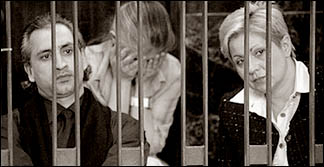Libya upholds death sentences in HIV case
Libya's supreme court today upheld the death sentences of five
Bulgarian nurses and a Palestinian doctor convicted of infecting
children with HIV, but there is hope the medics could still be spared.
|

Bulgarian medics Nasia Nenova (r), Snezana Dimitrova (c) and
Palestinian doctor Ashraf Hajjuj, behind bars during their
retrial in Libya.
AFP |
The health workers were arrested in 1999 and accused of infecting 438
children with HIV-tainted blood at a hospital in Benghazi, Libya's
second city. They have denied the charges and foreign scientists have
concluded that the epidemic was probably the result of poor hygiene.
The nurses and doctor were not in court for the verdict, which was
announced the day after a compensation deal was reportedly sealed with
the children's families.
There is hope the six could still be granted clemency by Libya's
higher judicial council, or see their sentences commuted to the prison
terms they have already served.
The EU commissioner for external relations, Benita Ferrero-Waldner,
who travelled to Libya last month aiming to secure the nurses' release,
said she hoped for clemency.
"I deeply regret the verdict of the supreme court confirming the
death sentence for the Bulgarian nurses and the Palestinian doctor.
However, I trust that the matter will now immediately be referred to a
higher authority, the supreme judicial council.
"I firmly hope that clemency will be granted to the medical staff.
This should be done in the same spirit of mutual respect and
humanitarian compassion which characterised the European response to the
plight of the Benghazi children and their families."
The nurses Snezhana Dimitrova, Nasya Nenova, Valya Cherveniashka,
Valentina Siropulo and Kristiana Valcheva, and the doctor, Ashraf Juma
Hajuj, have been in jail since February 1999 and were first sentenced to
death in 2004.
Optimism that the executions will not go ahead centres on a deal
involving a multi-million-dollar international fund for healthcare to
treat the victims. Libyan officials have said the families' acceptance
of a compensation settlement was key to resolving the case. It would
satisfy Islamic law and allow the death sentence to be withdrawn, they
said.
Vladimir Chukov, a history professor and expert on Middle East
affairs in Bulgaria's capital, Sofia, said the court's decision
satisfies the relatives of the children and Libyan public opinion.
"But, ironically, it could be positive for the medics as well,
because it marks the end of the year-long judicial procedures. Their
case is moving now on a political level and we hope that through
negotiations it will end with their release," he said.
European diplomats said last month they were "cautiously optimistic"
that the eight-year saga could be nearing its end, paving the way for
improved relations between the EU and the Muammar Gadafy regime.
At the supreme court hearing last month, observers described the
session as businesslike and less confrontational than previous
occasions, though families of the victims protested outside, holding
pictures of their infected children, 56 of whom have died.
Neither Libya nor the European Commission is prepared to discuss the
Benghazi International Fund, set up at the UK's urging. But the Guardian
understands that it is now worth about $50m (œ25m), with contributions
still coming in.
Part of it consists of Libya's state debt to Bulgaria, which is to be
written off. The money would be used to fund medical treatment in
Europe, medical facilities in Benghazi and a national HIV/Aids awareness
campaign in Libya.
The families have received smaller sums through civil cases.
Intense diplomatic activity has been going on in recent months, with
a date for last month's hearing only set after a visit to Libya by Ms
Ferrero-Waldner, and the German foreign minister, Frank-Walter
Steinmeier.
Tony Blair discussed the issue with Colonel Gadafy when he visited
Tripoli in May, and also met families of the victims. The US president,
George Bush, appealed for their release on a visit to Bulgaria.
The supreme court ordered a retrial for the health workers after an
international outcry over the 2004 verdicts.
The second trial ended with the same verdict last December despite a
scientific report weeks earlier saying HIV was rampant in the hospital
before the six began working there. Several of the nurses said they were
tortured and raped to procure confessions.
Two Libyans - a police officer and a doctor - were put on trial on
charges of torturing them and were later acquitted - which led to the
six medics being put on a new trial for defamation. They were acquitted
of the charge in May.
Guardian Unlimited ,UK
|
